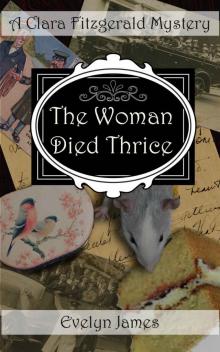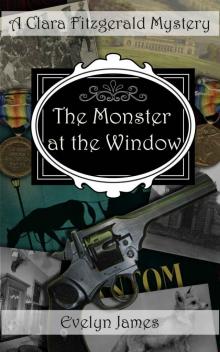- Home
- Evelyn James
The Traitor's Bones Page 6
The Traitor's Bones Read online
Page 6
“We all have things we are scared of, that is nothing to be ashamed about. The only time it hurts is when it prevents us from doing something we really want to do, or feel we should do,” Annie went back and fetched the cup of tea she had brought in. “That is when I make myself a fresh brew and let the tea leaves do their work.”
She offered him the cup. Tommy did not look at her.
“My nan could read the leaves,” she said, trying to move the conversation along and distract them both from the situation. “She reckoned that the leaves would tell you what to do when you had a dilemma. If you thought about your problem while drinking a cup, then the leaves at the bottom would reveal the solution. Then again, my nan had a very poor tea strainer, so she did end up with a lot of leaves at the base of her cups.”
Tommy grudgingly looked over his shoulder.
“Do you believe in that?”
Annie shrugged.
“It made my nan feel better. She based many life decisions on the leaves,” she said. “She bought a cow based on the leaves.”
“A cow?” Tommy asked.
“She was trying to decide whether to buy a cow or a goat to provide her with milk and she could not decide, so she asked the leaves. The leaves formed a picture of a cow. So, she bought Daisy and never looked back.”
“Your nan really believed in the power of leaves,” Tommy was starting to mellow. “Maybe there is something in it? Who are we to judge?”
Annie offered him the teacup again.
“You think a cup of tea can provide me with the answer to whether I should go to Belgium or not?” Tommy asked her in disbelief.
“Nothing ventured…” Annie replied.
“Fine,” Tommy groaned and then walked to the sofa in the room and sat down.
He sipped the tea, conscience of Annie watching him.
“Will you sit down beside me rather than hovering over me like a nurse or something?” He grumbled.
Annie tried to hide her smirk as she sat beside him. Tommy continued to drink and silence crept over them. Annie attempted to keep her eyes on the window and the garden outside rather than watching Tommy. She didn’t really believe in tea leaf magic, or all those weird superstitions her nan clung to. On the other hand, she did think that sometimes silly games could open your eyes to a solution to a problem. It wouldn’t hurt, anyway.
Tommy drained his cup.
“Now what?”
“There are a few ways to do the next bit, but my nan was not fancy. She just would look into the teacup and see what shape the leaves had formed.”
Tommy glanced into his cup.
“I see a heap of tea leaves.”
Annie took the cup off him. She did have to admit that the picture they painted was not very clear.
“Hang on,” she said.
She put the saucer on top of the cup and gave the whole thing a swirl while it was held in her hands. Then she removed the saucer and took another look.
“That’s better. The leaves have separated.”
She gave the cup back to Tommy, who was still looking sceptical.
“Let your mind relax and think about nothing as you concentrate on the leaves,” Annie said, remembering her nan’s words. “Try to find pictures in the leaves.”
“I don’t think I see anything, maybe you should look,” Tommy responded.
“It has to be done by you, it’s your thoughts and questions,” Annie shook her head.
Tommy gazed at the leaves for a long time. Then he gave a little sniff.
“I think I see the letter B,” he said.
“Anything else?”
Tommy curled up his face in concentration then shook his head.
“Give it another swirl,” Annie suggested.
Tommy obeyed and the leaves shifted position. He stared at them for even longer this time, a frown growing on his face.
“What is it?” Annie asked.
“Just a moment,” Tommy rose and went to a bookcase in the room. He selected a large size folio volume from the shelves and brought it back to the sofa. Scanning the index first, he opened it to a specific page and then pressed his finger down onto the paper.
Annie was looking over his arm and saw that he had turned to a double page spread showing a map of Europe. Tommy’s finger was sitting on Belgium.
“It’s a load of rot, of course,” Tommy grumbled to himself. “Just because the tea leaves look like the shape of Belgium, it means nothing.”
Annie took the cup from his hands and then compared the pattern in the leaves with the picture of Belgium on the map. The outline of the borders of the country did seem to match the shape that had formed in the tea leaves. Annie was rather astounded.
“I’ve never seen anything like that before!”
“It’s like the games psychologists play with funny blots of ink,” Tommy was still protesting. “You can read anything into a shape.”
“What about the letter B you saw?”
“Again, I was seeing what I wanted to see,” Tommy argued. “The mind is clever like that. It’s the unconscious part that does all this.”
“Then, you saw the letter B and you saw the shape of Belgium because you unconsciously feel you should go there?” Annie asked tentatively.
“Or because it is on my mind,” Tommy countered.
“But, why would it be on your mind if you did not think you should go there?”
“Look, it’s just a bunch of tea leaves,” Tommy slammed shut the atlas. “It doesn’t mean anything.”
Annie decided it was best to say no more. She had nudged Tommy in the right direction and she didn’t think pressing the matter further would do any good.
“I imagine my fruit cake must be done by now,” she stood up and started to leave the room. “Would you like a ham sandwich for lunch? I have leftover ham from Sunday’s dinner and there is homemade pickle?”
Tommy was silent, sitting forward with his hands clenched on his knees and looking miserable. Annie felt bad. She had meant to help him, but it looked more like she had added to his woes. She headed for the kitchen feeling awful.
Truth was, she could never understand what he was going through. It was outside of her own experience. Maybe pushing him was not the answer. Maybe he should just blank out that piece of his past. Trouble was, the more Annie thought about it, the more her instincts told her that Tommy had to face his demons and that meant going back to Belgium and walking in his past footsteps. Annie’s instincts were rarely wrong, and she trusted them. But was she right to trust them now?
Annie had become so distracted that it took her a moment before she realised that there was a smell of burning in her kitchen. With a flutter of panic, she raced to her oven and pulled her fruit cake out. It was charred a little at the edges and there was a fair chance it would be rather dry.
“Oh, for crying out loud!” Annie declared forcefully, slamming the offending cake down on the kitchen table.
Bramble, the Fitzgeralds’ black poodle, bounced into the kitchen and pranced on his back legs to see what the commotion was.
“You’re not getting any of it,” Annie told him firmly. “Do you know the last time I burned anything? Anything at all? It was 1918, and that only happened because someone shouted that a zeppelin was coming over and we all had to run for cover. And they were wrong, so it was not my fault I burned the pork joint that day.”
“Annie, what’s wrong?” Tommy entered the kitchen after hearing the noise.
“I burnt my fruit cake,” Annie puttered.
“Oh,” Tommy looked at the cake and then grinned. “Didn’t see that in the tea leaves.”
“You’re horrible,” Annie flapped a tea towel at him. “You know how I feel about burning food. It’s an awful waste!”
“It will be perfectly edible,” Tommy reassured her. “And you have to have these odd moments of imperfection so that us mere mortals know you are still human when it comes to cooking.”
Annie raised an eyebrow at him. He
was stepping into dangerous territory.
“If I get this out of the tin and get it cooling quickly, I might just salvage my pride,” Annie said in a mock haughty voice.
She grabbed up a cooling rack and inverted the cake onto it, shaking and tapping the tin to loosen the contents and free it.
“I’ve made a decision,” Tommy said while she was distracted. “But it has nothing to do with tea leaves.”
“Oh?” Annie said, not really listening.
“I’m going to go to Belgium,” Tommy said.
The cake loosened at the same moment and crashed out onto the wire cooling rack with a thud. Annie stared at it, then smiled.
“Good,” she declared. “In that case I am coming too. I want some new cake recipes.”
“You could have told me you were going to go sooner,” Tommy complained.
“Would it have made a difference?”
He had no answer.
“Then that’s settled,” Annie deftly turned her cake over so it was sitting properly on the rack. “Clara will be delighted.”
Chapter Eight
It was another two days before a reply came from Colonel Matthews. It was blunt and to the point.
“Thank you for your letter. I must decline your request to speak to me regarding Father Lound. I am not at liberty to speak on official matters concerning him.”
Clara was annoyed. There were no ‘official matters’ as far as she could tell. The matter had gone no further than a few rumours. She had not even mentioned that she was investigating Father Lound’s supposed treachery, only that she was trying to discover what had happened to him after he had vanished. She was not, however, defeated. She had been researching Colonel Matthews in Brighton’s library and had discovered which regiment he had served with. As it happened, she knew someone locally who had served with him.
Colonel Brandt was a friend of the late uncle of Captain O’Harris. He was long retired from the army and rather unsettled in civilian life. He had never married and his loneliness was palpable, so much so, that when Clara became involved in unravelling the mystery of what happened to the late O’Harris, she had ended up befriending the good colonel and inviting him for Sunday tea. He now visited them at least once a month, usually when Annie was doing her beef roast, which was his favourite.
Clara was hopeful that Brandt might be able to offer her an introduction to Colonel Matthews, but first she had to track him down. When Brandt was not at home he tended to be at the Brighton Gentleman’s Club which, as the name suggested, did not entertain women. Clara had never been one for listening to rules, however, and strode into the club without hesitation. The porter spotted her with a look of alarm and started in her direction. Clara held up a hand to halt him.
“I’m not here to cause trouble,” she assured him.
“That would be a first,” the porter grumbled.
Clara was amused, not offended.
“Is Colonel Brandt here?”
“He arrived an hour ago,” the porter replied cautiously.
“Could you pass a message to him saying that I would like a word,” Clara smiled politely.
The porter was suspicious, but he obeyed, deciding that was the safer option than resisting. Clara might do something awful like barge into the smoking room and disturb the gentlemen if he protested. It always puzzled Clara as to why the presence of a woman should be of such alarm to these men. Why were they so determined to flee from the feminine element of the population? Considering many were not married or were now widowed, it could hardly be blamed on a nagging wife at home they were aiming to escape.
The club butler bustled past as she was waiting and gave her a dark look. Clara responded with a wink and he hurried on even faster. Clara shook her head. It was really remarkable.
It was not long before the porter returned with Colonel Brandt. Brandt smiled at Clara and greeted her warmly.
“You look very well,” he said.
“And you,” Clara responded. “Annie says you must take some more of her homemade marmalade when you next visit.”
“Splendid! She does make it nice and tart, as I prefer. Care to come into the visitor’s lounge?”
Clara glanced at the porter who had a face like thunder.
“I wouldn’t mind,” she grinned.
Colonel Brandt showed her into the cosy lounge which was set aside for club members to meet with non-members. A number of the club’s patrons were businessmen who liked to arrange meetings within the private confines of the club. The lounge, however, was not supposed to ever have women inside it. Clara sat down in one of the huge leather sofas, almost disappearing. Colonel Brandt took a seat in the opposite sofa, settling down with a groan.
“Now, how can I help you?”
“I am hoping you know a gentleman called Colonel Matthews. He was in your regiment.”
“Not just in it,” Brandt chuckled. “He replaced me when I retired. They promoted him to fill my shoes, so to speak. What do you want with him?”
“I am working on a case that I think he has information about,” Clara explained. “No, actually, I know he has information, but I have to find a way to get him to talk to me. I wrote him a letter, but he refuses to discuss the subject.”
“And what is the subject?” Brandt asked.
“In essence, it is about a Catholic priest who vanished in 1917. Matthews wrote to the priest’s father informing him that there were rumours his son was a traitor. I want to know what evidence there is for that statement and whether Colonel Matthews knows anything more.”
Brandt whistled.
“That is a very serious allegation, especially against a priest. I assume the man was British?”
“Yes, and he has been missing since 1917. His sister wants to know what happened to him, she would also like it proved that he was not a traitor.”
“Messy business,” Colonel Brandt shook his head. “War makes men do funny things. Still, to write to someone to tell them that their son is a traitor is rather unpleasant.”
“Matthews was a friend of the family and I believe his letter was to act as a forewarning of potential trouble. The man in question was the son of Amadeus Lound.”
“That pompous politician!” Brandt gave a dismissive snort. “Yes, he would be having kittens if he thought his son was a traitor. Would tar his reputation. But nothing was ever said.”
“No, it would seem the situation went no further,” Clara agreed. “Possibly because Father Lound was simply impossible to trace.”
“And you want to know what really was going on? If there was anything to back up the accusations?”
“Yes, I want to know why Colonel Matthews wrote that letter. He must, I would hope, have had good reason. He is my only link with that element of the case.”
“I can see why Matthews would be cautious to speak with you,” Brandt said. “Treachery is a very sensitive subject. It may even be that he feels he was wrong in mentioning it in the first place.”
“If so, he does not appear to have made the effort to clear Father Lound’s name,” Clara replied. “You can’t go around accusing men of treachery and then pretend it never happened. He either had evidence for it or he did not. And if he did not, then he was wrong to cause the family such pain by mentioning the possibility.”
“I agree,” Colonel Brandt said gently. “But Matthews is not an ogre. He genuinely cares about his men and I always considered him a good officer. Very loyal, very patriotic. Perhaps a little stubborn, but not in a bad way. He was always very concerned about doing things properly. It would surprise me if he acted without genuine reason. He would not just report rumours.”
“Can you persuade him to speak to me?” Clara asked.
Colonel Brandt frowned.
“He was under my command for a time. I might be retired, but I still have a degree of authority, even if it is out of respect for the position I once held rather than anything official. Matthews went back to normal duties after the war, you only need so
many colonels in peacetime, but Matthews is a career man. He has his regimental office in London.”
“I wrote to his home address,” Clara said.
“He will spend much of his time in the city,” Colonel Brandt tapped his fingers on the arm of the sofa. “There is still a lot of post-war regimental work to do. Men are still being slowly discharged and then there is all the pension business and general paperwork. The further up the ranks you get the more time you spend behind a desk. I’ll see about arranging a meeting with him.”
“Thank you,” Clara was very grateful, having feared she might be stuck in this case before she began. “That will be much appreciated.”
“He is a good man,” Brandt repeated himself. “If he has called a man a traitor then I would not doubt him.”
Clara could offer no comment on that. She thanked Colonel Brandt again and then made her farewells. The club butler was very relieved to see her go.
Back on the street outside, Clara considered her options. So far everything was proving a dead end. Father Dobson had raised possibilities and given her an explanation for why Lound might betray his country, but no real answers. Clara wanted to speak to the other priests who had worked with Lound, but so far she had not been able to discover where they were. Albion Hope had ceased to exist in Belgium, from what she could tell, and those that had once worked there had moved on. Clara was reaching a point where the only reasonable next step was to go to Belgium and speak to the people who knew Lound when he was in the country. They were the ones who were with him before he vanished and might have some knowledge of what was going on at that time. The odds of solving this case from Britain were looking slimmer by the day.
The letters she had borrowed from Father Dobson had not revealed any great insight into Lound’s time in Belgium. They were almost as bland as the letters he wrote to his sister, though he did occasionally discuss ecclesiastical issues that were worrying him. Lound clearly felt that he should not take sides in the war, that his work meant he ought to be neutral and serve all as equals. He had raised the subject at a time when several injured German soldiers were being held prisoner in the little town where Albion Hope stood. He had visited the men to offer them spiritual comfort and had been admonished by a British officer. He had felt stung by the rebuke and was trying to justify himself to Dobson. Clara had no idea what Dobson’s reply was, but by the next letter Lound seemed to have regained his former confidence.

 The Woman Died Thrice
The Woman Died Thrice The Poison Pen
The Poison Pen The Fossil Murder
The Fossil Murder The Green Jade Dragon
The Green Jade Dragon Murder on the Mary Jane
Murder on the Mary Jane Murder and Mascara
Murder and Mascara Mr Lynch's Prophecy
Mr Lynch's Prophecy The Traitor's Bones
The Traitor's Bones The Valentine Murder
The Valentine Murder Death at the Pantomime
Death at the Pantomime The Cowboy's Crime
The Cowboy's Crime The Trouble With Tortoises
The Trouble With Tortoises The Monster at the Window
The Monster at the Window